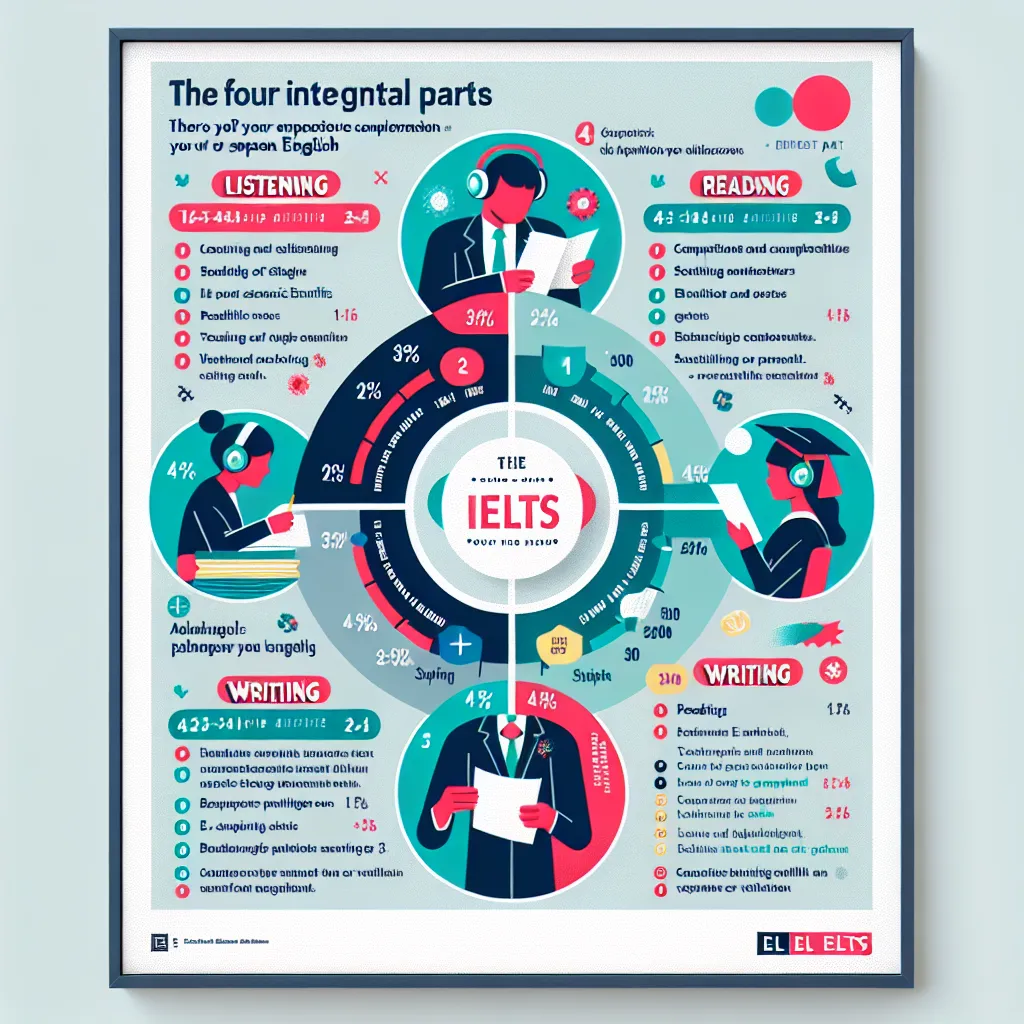Preparing for the IELTS exam is a crucial step towards achieving your academic or professional goals. One of the most common questions among test-takers is, “How Long Should I Study For The IELTS Test?” The answer to this question varies depending on several factors, including your current English proficiency level, target score, and available time. In this comprehensive guide, we’ll explore the ideal study duration and provide expert tips to help you maximize your IELTS preparation.
Understanding the IELTS Test
Before diving into the study timeline, it’s essential to understand what the IELTS test entails. The International English Language Testing System (IELTS) assesses your English language proficiency across four key skills: Listening, Reading, Writing, and Speaking. Each section requires different preparation strategies and time investments.
 IELTS Test Components
IELTS Test Components
Factors Affecting Your Study Duration
Current English Proficiency Level
Your starting point is crucial in determining how long you should study for IELTS. Consider taking a diagnostic test to assess your current level:
- Beginner to Lower Intermediate: 6-12 months of intensive study
- Upper Intermediate: 3-6 months of focused preparation
- Advanced: 1-3 months of targeted practice
Target IELTS Score
Your goal score plays a significant role in your study timeline:
- For a 0.5-1 band score improvement: 1-2 months of dedicated study
- For a 1-1.5 band score improvement: 2-4 months of intensive preparation
- For a 2+ band score improvement: 4-6 months or more of rigorous study
Available Study Time
Consider your daily or weekly study availability:
- Full-time study: 4-8 hours daily can significantly reduce overall preparation time
- Part-time study: 2-3 hours daily may require a longer preparation period
- Limited time: Even 1 hour daily can be effective if consistent over a more extended period
Recommended Study Durations
Based on the factors mentioned above, here are some general guidelines for IELTS preparation:
- Minimum preparation time: 1-2 months (for advanced learners aiming for a modest score improvement)
- Average preparation time: 3-4 months (for intermediate learners targeting a 1-band score improvement)
- Extended preparation time: 6-12 months (for beginners or those aiming for significant score improvements)
Remember, these are general recommendations. Your personal learning pace and dedication can significantly impact these timelines.
Creating an Effective IELTS Study Plan
Step 1: Assess Your Starting Point
Take a full-length IELTS practice test to determine your current band score and identify areas for improvement.
Step 2: Set Realistic Goals
Based on your diagnostic test results, set a target score and determine how much improvement you need in each section.
Step 3: Allocate Study Time
Divide your available study time among the four IELTS sections, focusing more on your weaker areas.
Step 4: Choose Quality Study Materials
Invest in reputable IELTS preparation books, online courses, and practice tests. Our guide to the best IELTS preparation materials can help you choose.
Step 5: Create a Study Schedule
Develop a weekly study plan that includes:
- Skill-specific practice (Listening, Reading, Writing, Speaking)
- Vocabulary and grammar exercises
- Full-length practice tests
- Review and reflection sessions
Tips for Efficient IELTS Preparation
-
Consistency is key: Regular, daily practice is more effective than sporadic, intensive study sessions.
-
Immerse yourself in English: Watch English-language movies, read news articles, and listen to podcasts to improve your overall language skills.
-
Focus on your weaknesses: Allocate more time to the sections where you struggle the most.
-
Practice time management: Familiarize yourself with the time constraints of each IELTS section and practice working within these limits.
-
Seek feedback: Join IELTS study groups, work with a tutor, or use online forums to get constructive feedback on your progress.
-
Simulate test conditions: Take full-length practice tests under timed conditions to build stamina and confidence.
 IELTS Study Tips
IELTS Study Tips
Common Pitfalls to Avoid
-
Cramming: Last-minute intensive study is rarely effective for language learning.
-
Neglecting speaking practice: Many students focus on written materials and forget to practice speaking regularly.
-
Ignoring the official IELTS format: Familiarize yourself with the exact format and question types used in the actual test.
-
Overlooking general English improvement: While test-specific strategies are important, overall language proficiency is crucial for success.
Next Steps in Your IELTS Journey
Now that you have a better understanding of how long you should study for the IELTS test, it’s time to take action:
- Take a diagnostic test to assess your current level.
- Set your target score and create a personalized study plan.
- Gather high-quality study materials and resources.
- Start your IELTS preparation journey with dedication and consistency.
Remember, the key to IELTS success lies not just in the duration of your study, but in the quality and consistency of your preparation. By following this guide and maintaining a steady commitment to improvement, you’ll be well on your way to achieving your desired IELTS score.
Are you ready to embark on your IELTS preparation journey? Share your study plan and goals in the comments below, and don’t forget to check out our other IELTS preparation resources to support your learning journey.




